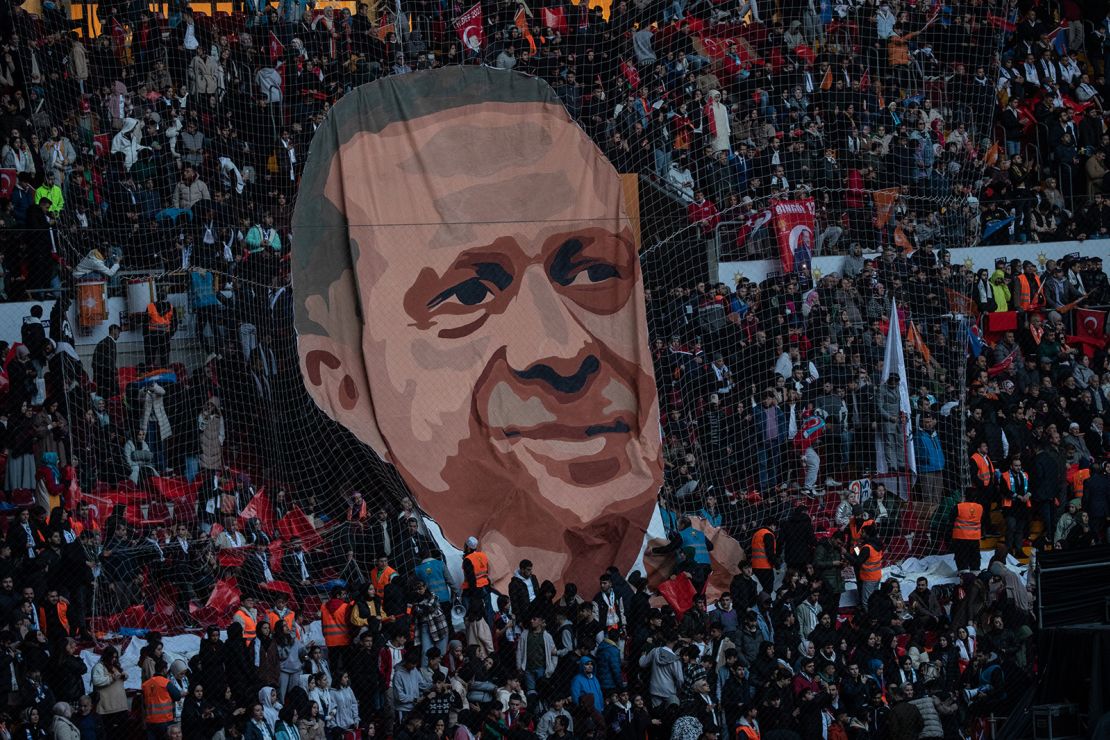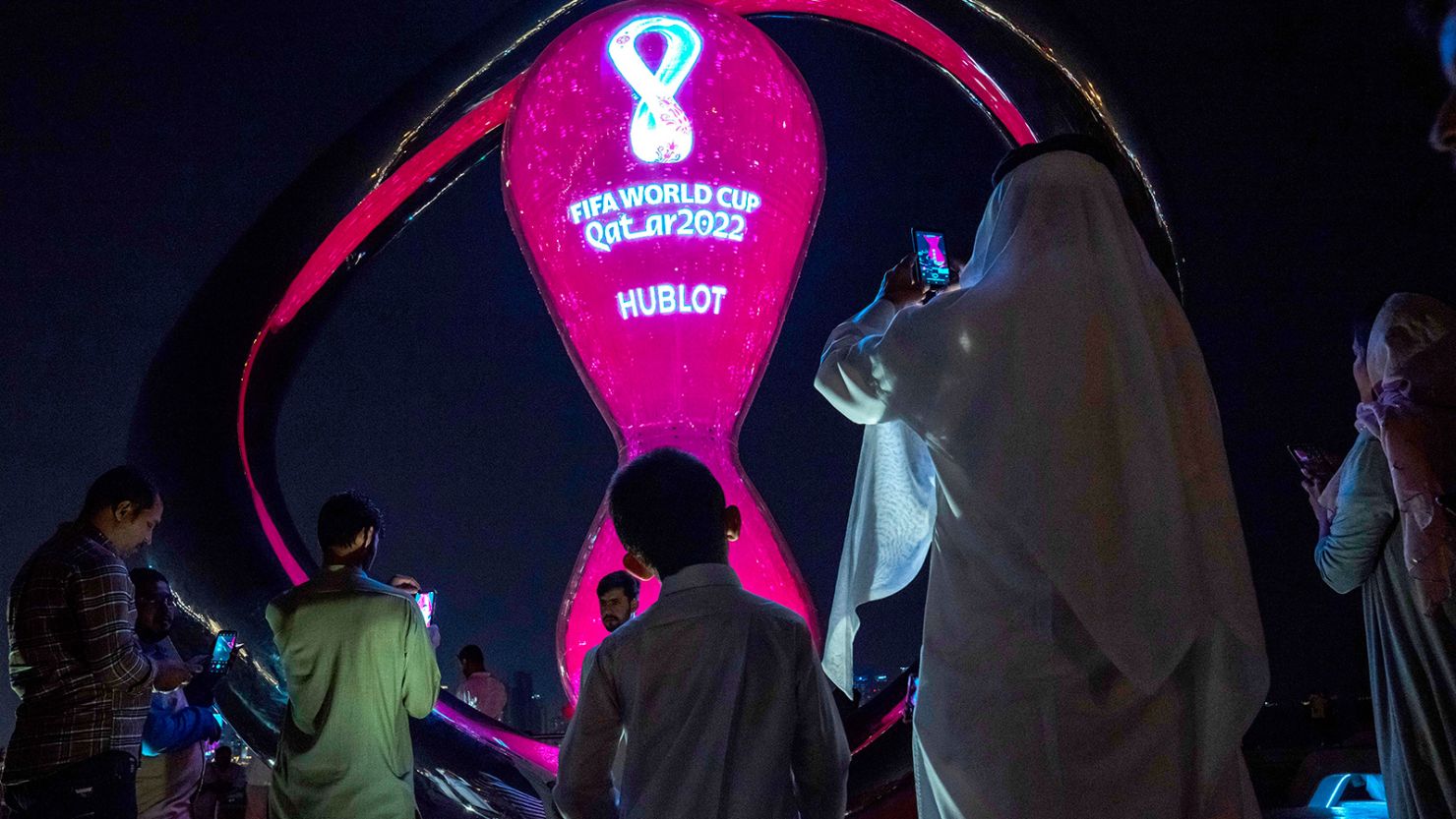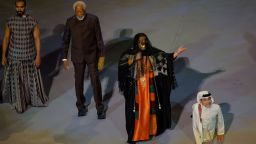Editor’s Note: A version of this story first appeared in CNN’s Meanwhile in the Middle East newsletter, a three-times-a-week look inside the region’s biggest stories. Sign up here.
Qatar is unrecognizable from the country it was 12 years ago when it won its bid to host the 2022 FIFA World Cup. Around $220 billion has been pumped into building an entirely new city, a state-of-the-art metro system and hundreds of new hotel and apartment buildings.
Like previous countries to host major events, Qatar has been under the watchful eye of the international community. At the same time, its own people have been exposed to international ideals as well as shifting cultural and societal norms as they anticipated the influx of over a million football fans to their tiny country.
“Qatar changed a lot in the past 12 years and, culturally speaking, this has made a huge impact,” 30-year-old Qatari football fan Ali Adnan Abel told CNN. “We have seen more diversity that has made Qataris realize it’s time to let the shields down.”
In hosting the World Cup, Qatar has been under intense pressure to enact legal changes. It dismantled the controversial Kafala system, a long-established regional labor practice that gives companies and the minority citizen population control over migrant workers’ employment, movement, and immigration status.
“What we’ve seen in this case is, certainly there was no attention whatsoever internationally or even on a national level to the treatment of migrant workers in Qatar and that certainly did change after Qatar won the ability to host the World Cup,” James Lynch, director of the human rights group FairSquare and a former British diplomat in Doha, told CNN on Saturday.
But questions remain as to whether the reforms will stick once the tournament is over and the world’s gaze shifts away from the Gulf nation.
The Qatari organizers of the event insist those changes are here to stay.
“All of this is actually part of the vision that we have for 2030 and it is one of the pillars of that vision,” Fatma Al Nuaimi, a spokesperson for the organizers, Qatar’s Supreme Committee, told CNN’s Becky Anderson, referring to the government’s blueprint for its future.
Qatar, a deeply conservative Muslim country, relaxed alcohol laws in the lead-up, allowing fans to drink in specific zones even though being drunk in public is illegal – although just two days before kick-off, FIFA announced that no alcohol would be sold at stadiums.
The tournament has also given the opportunity for men and women to mingle in an otherwise segregated country. Women and children have had a strong presence in fan zones and stadiums , watching the games in what has traditionally been a male-dominated sphere.
However, history shows that it is uncommon for large sporting events like the World Cup or the Olympics to be long-term catalysts for societal change. Russia infamously hosted the World Cup in 2018 and sought to project an image of tolerance by allowing fans to carry rainbow flags despite a yearslong crackdown on the LGBTQ community.
But Russian President Vladimir Putin has since shunned liberalism, as tensions with the West spiraled, and after invading Ukraine earlier this year, Moscow came down hardon any subsequent anti-war protests. And just last week, the lower house of the country’s parliament passed an amendment to its “LGBT propaganda” law, banning all Russians from promoting or “praising” homosexual relationships or publicly suggesting that they are normal.
On the other hand, studies have shown that the international perception of Germany was enhanced after it hosted the 2006 World Cup, and much of the sporting infrastructure put in place is still in use.
“For there to be a positive legacy, this change has to keep on going,” said Thomas Ross Griffin, an assistant professor of American and postcolonial literature at Qatar University. “And what the history of tournaments in London, Brazil, Russia told us, is that change often ends once the final whistle is blown. It’s on Qatar to demonstrate to the world that their change is something that would be kept going beyond the final game of the tournament.”
While changes have been made to Qatar’s labor laws, human rights groups say more needs to be done. Just one month before the World Cup began, Amnesty International said the 2020 labor reforms had not been implemented or enforced properly. Qatar, it said, continues to lack freedom of expression and association and discriminates against women and LGBTQ people in law.
“Now, the question is if [this reform] wasn’t implemented properly before the World Cup with the eyes of the world on Qatar, what are the prospects after the World Cup that’s the big concern,” Lynch said.
While some have called for a boycott of Qatar for its treatment of LGBTQ people, others have argued that going to Doha and showing solidarity with the LGBTQ community there can affect lasting change. Spain’s openly gay sports minister, Miquel Iceta, said Thursday that hosting the World Cup will mean long-lasting improvement in Qatar’s human rights record by bolstering freedom and tolerance in the country.
Jakob Jensen, the Danish football association chief commended the changes that have taken place in Qatar since 2010 in an interview with CNN’s Becky Anderson Thursday. “We do not believe in boycotting. We do believe you make a difference participating, discussing, engaging and dialogue,” he said.
Others however see Qatar hosting the event as a slap in the face for human rights activists. At FIFA’s 72nd annual Congress in April, the Norwegian football association President Lise Klaveness delivered a stinging speech that labeled the decision to award Qatar the tournament as “unacceptable” and demanded that FIFA do more to defend its principles.
It will likely take months and even years before the true extent of the World Cup’s influence on the tiny Gulf state is known, says Lynch.
“I think there will be an expectation that there will be comparable scrutiny for future major projects, and I think that’s a good thing,” he said. “Whether it leads to whole-scale reform, I think that’s a bigger question and I think we’ll have to wait to see.”
Iran protests
Farideh Moradkhani, a niece of Iran’s Supreme Leader Ayatollah Khamenei, called on foreign governments to cut all ties with the Iranian government in a video statement shared on YouTube by her brother, Mahmoud Moradkhani, two days after she was arrested.
Farideh, who is a well-known rights activist opposed to the Iranian regime, was arrested on Wednesday when she went to the prosecutor’s office to serve a court order, according to a tweet from her brother that day.
CNN cannot independently verify when Farideh recorded the video statement shared by her brother on YouTube on Friday, and have reached out to Mahmoud for clarification.
Here’s the latest:
- UNICEF on Sunday called for an end “to all forms of violence and abuse that have reportedly claimed the lives of over 50 children and injured many more” in Iran.
- Iranian footballer Voria Ghafouri has been bailed out after being arrested on charges of “incitement against the regime,” Fars reported on Saturday.
- State-aligned Fars News was hacked on Friday, according to a message displayed on its website. The group, which identifies itself as “Black Reward,” posted a message in Farsi condemning the news organization and the government.
- UN Human Rights Council President Federico Villegas told CNN’s Becky Anderson on Friday that he is confident Iran will cooperate with a UN fact-finding mission into human rights abuses committed during the protests
The digest
Turkish, Egyptian ministers to meet in process of building ties
Turkish President Tayyip Erdogan said on Sunday that a process of building relations with Egypt will start with ministers of the two countries meeting, Reuters reported.
- Background: Ankara’s ties with Cairo have been strained since Egyptian President Abdel Fattah el-Sisi, then the Egyptian army chief, led the 2013 ouster of Mohammed Mursi of the Muslim Brotherhood, who was strongly supported by Erdogan.
- Why it matters: Turkey has been on a push to ease tensions with Egypt and several other countries in the region since last year. Erdogan shook hands with Sisi in Qatar last week in what was described by an Egyptian presidency statement as a new start in bilateral relations. In a televised discussion program on Saturday, Erdogan said that he and Sisi had spoken for around half an hour to 45 minutes on the sidelines of the World Cup in Qatar.
Arab Monetary Fund signs $1 billion pact to support Yemeni government reforms
The Arab Monetary Fund has signed a $1 billion agreement to support Yemen’s economic reform program to its Saudi-backed government, Saudi state media said on Sunday. The new package by the Abu Dhabi-based fund, which includes countries from the Middle East and North Africa, will provide support for the Yemeni government’s efforts to stabilize the economy from 2022 to 2025, Reuters reported, citing Saudi Ekhbaria TV.
- Background: After the Houthi rebels stormed the capital Sanaa in 2014 and ousted the government, sending it into exile, Yemen’s central bank split into two branches – one in Sanaa, under Houthi control, and one internationally recognized branch in Aden, which has access to money printers. Aden’s branch is under the control of the Saudi-backed administration.
- Why it matters: The war between the Houthi group and a Saudi-led coalition has brought Yemen’s economy to its knees and caused the world’s largest humanitarian crisis. Inflation and foreign currency shortages have made food, water and fuel unaffordable for many in Yemen, which imports most of its needs. The Yemeni riyal has reached all-time lows in provinces controlled by the Saudi-backed government.
This year has been the deadliest for Palestinians and Israelis since early 2000s
This year is already the deadliest in the Palestinian-Israeli conflict in Israel and the West Bank since the early 2000s, a CNN analysis of official numbers from both Israel and the Palestinian Authority shows. The Israel number includes security forces and civilians killed in Palestinian attacks in Israel and the West Bank. Most were Israeli citizens, but the number includes foreigners living in Israel, according to the Israeli Security Agency, more commonly known as the Shin Bet. The Palestinian Ministry of Health told CNN that 150 Palestinians in the West Bank, East Jerusalem and Israel have been killed this year, mostly by Israeli security forces – a number that includes militants and civilians.
- Background: The death over the weekend of Tadasa Tashume Ben Ma’ada from wounds in last Wednesday’s double bombing in Jerusalem brings the number of people killed on the Israeli side to 31 this year, according to Israeli Security Agency (ISA) data and a CNN count.
- Why it matters: The Israeli military is increasingly targeting new militant groups in Jenin and Nablus and claims most of the Palestinians killed were militants or engaging violently with their forces. Human rights groups say dozens of unarmed civilians have been killed as well.
World Cup
Iranian state media has called for the US to be kicked out of the World Cup after the United States Soccer Federation changed Iran’s flag on its social media platforms to show support for protesters in Iran.
The federation had temporarily displayed Iran’s national flag on its official Twitter, Instagram and Facebook accounts without the emblem of the Islamic Republic. A now-deleted graphic of the Group B standings posted on Saturday displayed the Iranian flag only bearing its green, white and red colors.
US Soccer told CNN on Sunday that it wanted to change the official flag for 24 hours to show “support for the women in Iran fighting for basic human rights” but always planned to go back to the original flag.
Read more:
- Iran’s Football Federation demanded that Jurgen Klinsmann, the German soccer legend and former coach of the US men’s national team, apologize and resign from his position with FIFA after comments he made about the Iranian team.
- Morocco won its first World Cup match since 1998 – and its third ever – securing a sensational 2-0 victory over heavyweight Belgium. Morocco’s win triggered riots in Brussels.
- Two friends spent three months cycling 7,000 kilometers from Paris to Doha to watch France at Qatar 2022.
- World Cup soccer fans have been stopped by security officials for wearing rainbow-colored items.
- Crusader costumes being worn by England fans are ‘offensive,’ says FIFA.
- Football or soccer? It’s complicated.
Photo of the day




